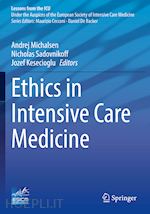
Questo prodotto usufruisce delle SPEDIZIONI GRATIS
selezionando l'opzione Corriere Veloce in fase di ordine.
Pagabile anche con Carta della cultura giovani e del merito, 18App Bonus Cultura e Carta del Docente
In this book, part of the European Society of Intensive Care Medicine (ESICM) textbook series, experts in the field of clinical ethics describe basic principles of clinical ethics and ethical reasoning, the fundamental pillars of intensive care medicine as well as the decision-making processes necessary to arrive at appropriate decisions for each individual patient. Specifically, the complex decision-making process, with regard to limiting life-sustaining therapies and integrating palliative care into intensive care, are expounded. Furthermore, the still controversial topics of ethical climate, proportionate care, and prioritization are elaborated upon. The so-called “soft skills” of inter-professional communication and co-operation are given the attention they deserve in order to overcome the gap between technological progress and interpersonal standstill. Finally, widely accepted ethical values and principles were challenged by the Covid-19 pandemic, forcing clinicians to elaborate recommendations regarding the prioritization of scarce resources.
The book will be an invaluable tool for clinicians to understand ethical principles and reasoning to contend ethical challenges in intensive care medicine across the boundaries of disciplines and professions, in order to provide an appropriate individual plan of treatment for their patients.
Series Editors
Prof. Maurizio Cecconi is Head of Department Anaesthesia and Intensive Care Units, IRCCS Istituto Clinico Humanitas, Rozzano (MI), Italy and Professor of Anaesthesia and Intensive Care, Humanitas University, Pieve Emanuele (MI), Italy. His main fields of research are haemodynamic monitoring, haemodynamic optimisation and physiology of the critically ill patient. He has published extensively and has specific interest in haemodynamic monitoring and fluid management of the critically ill.
Prof. Daniel De Backer is Professor of Intensive Care at the Université Libre de Bruxelles, Brussels, Belgium Head of Intensive Care Departments of CHIREC Hospitals (Brussels and Braine l’Alleud-Waterloo). His main fields of investigation are severe sepsis, organ dysfunction, acute circulatory failure and its treatment (in particular vasoactive agents), haemodynamic monitoring, hepato-splanchnic circulation and microcirculatory disorders.
Volume EditorsAndrej Michalsen, MD, MPH, was born 1957 in Überlingen/See, Germany. He received his medical training at the medical schools of Kiel, Freiburg and Tübingen universities as well as at the University of Texas School of Public Health in Houston, TX, U.S.A., and he has worked at the academic hospitals of Mainz, Germany, and Utrecht, the Netherlands. He is currently working as a consultant in Anaesthesiology and Critical Care at Konstanz Hospital, Germany. Amongst others, he is a member of the Section on Ethics of the European Society of Intensive Care Medicine (which he chaired from 2013 until 2016), a member of the Ethics Section of the German Interdisciplinary Association of Intensive Care and Emergency Medicine, and a member of the Ethics and Conflict of Interest Committee of the American Thoracic Society. He has published and lectured extensively in the field of clinical ethics, his main areas of interest particularly comprising end-of-life care, appropriateness of care and prioritization in health care delivery.
Dr. Sadovnikoff obtained his medical degree from Brown University in 1984. He is trained and board-certified in Internal Medicine, Critical Care Medicine and Anesthesiology, and was for 16 years the Co-Director of the Surgical Intensive Care Units as well as program director of the Fellowship in Anesthesiology Critical Care at Brigham and Women’s Hospital (BWH) in Boston, MA He was inducted as a fellow in the American College of Critical Care Medicine (FCCM) in 2008. He is currently Interim Chair of the Department of Anesthesiology, Critical Care and Pain Medicine at St. Elizabeth’s Medical Center in Brighton, MA.
In 2008-9, he completed the Fellowship in Medical Ethics at Harvard Medical School. He served for seven years as Co-Chair of the BWH Ethics Committee, was Associate Director of the BWH Office of Clinical Ethics and has achieved certification in Healthcare Ethics Consultation (HEC-C). He is the Vice-Chair of the ASA Committee on Ethics and was the 2019 recipient of the Shubin-Weil Master Clinician/Teacher Award from the Society of Critical Care Medicine. He is Co-Editor with Dr. Andrej Michalsen of an international volume of articles entitled Compelling Ethical Challenges in Critical Care and Emergency Medicine (Springer, 2020).
Jozef Kesecioglu is Professor of Intensive Care Medicine at the Department of Intensive Care Medicine, University Medical Center, Utrecht, the Netherlands. He has been the chair of the Department of Intensive Care Medicine between 2005-2020. During this period, he has re-organised the pre-existing four intensive care units and made one department of it before designing and moving to the new, award winning, state-of-the-art ICU.
Professor Kesecioglu was Chairman of the Ethics Section of the European Society of Intensive Care Medicine (ESICM). After finishing his term, he worked in the Executive Committee of ESICM as the Chair of the Division of Scientific Affairs. In 2016, he is has become the President Elect of ESICM. He has been the President of ESICM between 2018-2020. He was awarded with ESICM Society Medal in 2022.
Professor Kesecioglu has authored around 175 published or in-press peer-reviewed papers and has been giving lectures in various scientific meetings. His main interests are ethics, intensive care environment, and selective decontamination of the digestive tract.











Il sito utilizza cookie ed altri strumenti di tracciamento che raccolgono informazioni dal dispositivo dell’utente. Oltre ai cookie tecnici ed analitici aggregati, strettamente necessari per il funzionamento di questo sito web, previo consenso dell’utente possono essere installati cookie di profilazione e marketing e cookie dei social media. Cliccando su “Accetto tutti i cookie” saranno attivate tutte le categorie di cookie. Per accettare solo deterninate categorie di cookie, cliccare invece su “Impostazioni cookie”. Chiudendo il banner o continuando a navigare saranno installati solo cookie tecnici. Per maggiori dettagli, consultare la Cookie Policy.